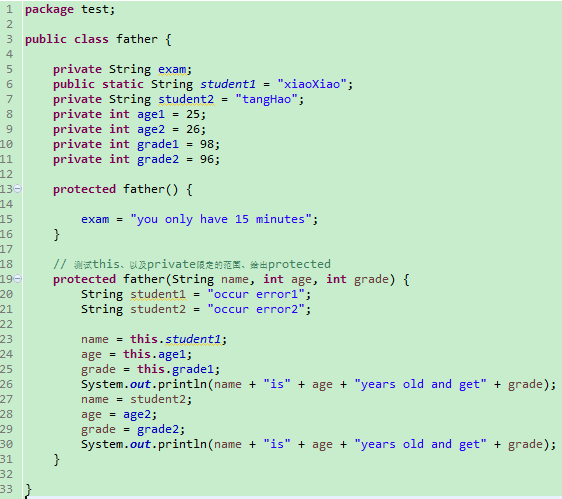浅析构造函数,及public、private、protected、final、this、super关键字
初学JAVA,感觉很多知识点不熟悉,看了好多遍教材,最终还是决定把它写下来,加深印象以便忘了的时候再过来复习一下。看上去字数可能比较多,其实内容很简明。
首先看this的用法:
1 package test; 2 3 public class father { 4 5 private String student1 = "xiaoAi "; 6 private String student2 = "jiangQiao "; 7 private int age1 = 25; 8 private int age2 = 26; 9 private int grade1 = 98; 10 private int grade2 = 96; 11 12 protected father(String name, int age, int grade) { 13 String student1 = "occur error1 "; 14 String student2 = "occur error2 "; 15 16 name = this.student1; 17 age = this.age1; 18 grade = this.grade1; 19 System.out.println(name + "is" + " " + age + " years old and get" + " " + grade); 20 21 name = student2; 22 age = age2; 23 grade = grade2; 24 System.out.println(name + "is" + " " + age + " years old and get" + " " + grade); 25 } 26 27 public static void main(String[] args) { 28 new father("cc", 25, 100); 29 30 } 31 32 }
在father这个构造函数里,对已经初始化的变量再次赋值,student1用的是this.的方式,它的作用是在这个函数里面去引用外部的成员变量。student2则不是这样,因为在father函数中,student2被重新String并赋值,此时作为局部变量,在优先级上高于成员变量,它没有使用this关键字,所以输出的结果如图:

super:
1 package test; 2 3 public class father { 4 5 public String student = "xiaoXiao"; 6 7 protected father() { 8 9 } 10 11 // 测试this、以及private限定的范围、给出protected 12 protected father(String name, int age, int grade) { 13 14 } 15 16 }
1 package test; 2 3 public class remote extends father { 4 5 String student = "occur error"; 6 7 protected remote(String name, int age, int grade) { 8 9 name = super.student; 10 System.out.println("Here is " + name + " *** " + age + " *** " + grade); 11 12 } 13 14 public static void main(String[] args) { 15 16 new remote("xiXi", 25, 100); 17 18 } 19 }
这里,remote类中初始化了student,但实际上它有从father继承的属性。此时如果我们通过构造函数16行new一个新的出来,那么它会执行第10行,打印信息为??

Right anwser is "xiaoXiao" rather than "occur error"。因为super关键字可以从父类中获取到开放的成员变量,也就是说该变量不能被private所修饰。
如果把使用this和super比作上楼梯台阶,this能做到一下一格,super则一下两格。
protected:
1 package test; 2 3 public class father { 4 5 public static void main(String[] args) { 6 Remote rc = new Remote(); 7 rc.println(); 8 9 } 10 11 }
1 package test; 2 3 public class Remote { 4 5 private String exam = "you only have 30 minutes"; 6 7 protected void println() { 8 System.out.println(exam); 9 } 10 11 }
同一个package下面,可以成功调用。不同package就不可以了,系统会提示让你把protected换成public,即使是继承关系,也不可以。这样看来,protected确实起到了保护的作用,但不如private彻底。

final:
顾名思义有点“最后的”意思,因此这个理解起来好像更容易点,就是当final关键字修饰变量的时候,该变量必须初始化并且不能再被赋值,也就是怎么出现怎么离开。当它修饰类的时候,这个类就不能在被继承,感觉像是shutdown。
最后关于构造函数,其实也已经涉及在前面的代码里面,我个人理解构造函数的使用看你的需求怎样。比如:

这里的构造函数是father()和father(String ,int , int );也就是当你father ff = new father();这么干的时候,可以决定是否在括号里输入参数,或输入怎样的参数来达到某种目的。当你任何构造函数都不写的时候,系统会默认一个无参构造函数。
写的有不对的地方烦请大家指正,共同进步。


